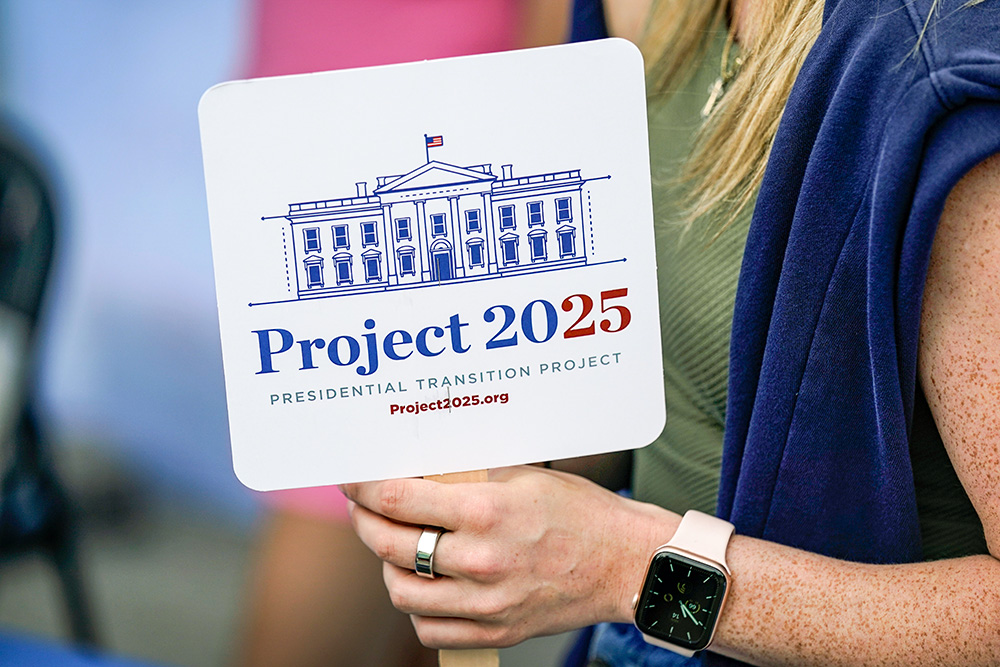
Kristen Eichamer of the Heritage Foundation holds a fan in Project 2025's tent at the Iowa State Fair, Aug. 14, 2023, in Des Moines, Iowa. (AP/Charlie Neibergall)
In February 2024, the German bishops stated that ethnic nationalism is incompatible with Christianity and urged Christians to have nothing to do with one nationalistic party. Two months later, two U.S. bishops — John Stowe of Lexington, Kentucky, and Michael Burbidge of Arlington, Virginia — declared that authentic Catholic teaching was not compatible with Christian nationalism.
These American bishops did not identify a particular party, but the evidence is hiding in plain sight.
White Christian nationalism has provided powerful factions inside the Republican Party with a narrative for imposing an agenda called Project 2025, spelled out in a 920-page document. It was funded and promoted by the Heritage Foundation, written by conservative scholars, and identifies the dramatic changes that will be imposed on the country in a new Republican administration.
At the same time, Catholic teaching about moral issues in the public sphere is outlined in a 50-page report called "Forming Consciences for Faithful Citizenship," a voters' guide developed by the U.S. Conference of Catholic Bishops.
Contrasting the two documents demonstrates the moral danger in voting for a Republican president.
Project 2025 operationalizes the tenets of white Christian nationalism on such issues as climate change, education, immigration, systemic racism, and abortion. Contrasting the scholars' policies with the bishops' positions on such high-profile concerns reveals what makes the Republican game plan so dangerous.
Project 2025 operationalizes the tenets of white Christian nationalism on such issues as climate change, education, immigration, systemic racism, and abortion.
Outlined below are the moral issues in tune with the bishops' progressive agenda but in conflict with Project 2025. They are followed by the bishop's conservative agenda, which is more consistent with the Republican plan.
Climate change
The bishops, echoing the encyclicals of Pope Francis, teach that climate change is a moral issue that calls for an ecological conversion to change our lifestyle at home and to assume a position of leadership in addressing that issue with other nations.
But the authors of Project 2025 demand the rolling back of efforts to address climate change, eliminating that topic in developing federal policy, and the withdrawal of the United States from any cooperative agreements that address environment concerns. Their agenda promotes policies that would increase the production of fossil fuels and reduce those that promote renewable energy. They will retaliate against those in the government who oppose their radical policies.
Migration
The bishops appeal for legislation that would provide comprehensive immigration reform. They invoke Catholic teachings as the basis for receiving refugees, asylum seekers and other migrants, while securing the borders.
The policies outlined in Project 2025 betray an anti-immigrant bias. The standards for asylum seekers are to be tightened; the office that assists migrants is to be eliminated; certain visa programs are to be capped or phased out. Even more drastic, the document calls for an aggressive search for undocumented people, including the millions who have lived here for some time, and their eventual deportation.
Advertisement
Racism
The bishops refer to racism as a festering wound that still troubles our nation, referencing their 2018 pastoral letter, "Open Wide Our Hearts." That letter insists that the sin of racism persists in our country and is fueled by extreme nationalist ideologues. The bishops encourage Catholics to work against policies and institutional barriers that preserve economic and social inequality.
The authors of Project 2025 argue that reducing barriers to inequality is racist because it gives an unfair advantage to people of color. Emboldened by this white Christian nationalist belief, the authors insist on dismantling policies and programs designed to address the consequences of institutionalized racism.
Peace and justice
The bishops yearn for the spread of peace and justice both in our country and the world. At home, in addition to the areas mentioned above, they call for policies that foster a better distribution of income, work to end the death penalty, and promote civil discourse. They express a deep concern for the poor, supporting such policies as providing health care, reliable income through Social Security, and the Earned Income Tax Credit. The bishops call on the United States to be a global leader in seeking justice and to join with other nations and groups to alleviate global poverty, address regional conflicts and care for creation.
The words "wealth gap" and "income inequality" cannot be found in the 920-page Project 2025 document. The project shows little concern for the poor. For example, Head Start is to be eliminated, eligibility and work requirements for food programs are to be raised, public housing benefits for noncitizens or mixed-status families are prohibited.
Project 2025 describes an agenda for "peace" that includes expanding and upgrading the nuclear arsenal and providing more spending on defense. Both strategic missile and anti-missile systems would be improved and expanded. Also to be expanded and prioritized is irregular warfare, which is described as using national power to project influence abroad and to "maintain peace in great-power competition."
Regarding cooperation with allies, the project calls for freezing or cutting back funding for a variety of services to other nations as well as reviewing and withdrawing from agreements and treaties with them.
The bishops try to persuade voters using Catholic teachings, while the Republican document proposes to enforce its agenda through political appointees to 'break or bend the bureaucracy to the president's will.'
Project 2025 does support the bishops' conservative positions.
Religious freedom
Religious freedom is defined as protecting religious entities from supporting something that goes against their consciences. For example, religious freedom would prohibit funding that allows women to travel for an abortion because it violates the religious freedom rights of Americans who object to abortions on moral grounds. Catholic schools would not have to recognize the rights of those in same-sex marriages because church teaching holds that marriage is between a man and a woman.
Education
Project 2025 holds that parents should be able to place their children in religious schools through a voucher system that accesses public money. Catholic schools would be especially aided by such legislation because they make up the majority of religious schools.
Abortion
The greatest overlap between Project 2025 and the bishops' moral agenda is the emphasis on prohibiting abortion. (The Project 2025 document mentions "abortion" some 200 times, twice as often as "private sector.") This emphasis includes cutting funding for agencies that provide abortions, requiring statistics on all circumstances surrounding any abortion, and withdrawing from agreements, including those with the U.N. that allow this procedure.
However, this emphasis on abortion highlights an underlying difference between the bishops' statement and Project 2025. The bishops try to persuade voters using Catholic teachings, while the Republican document proposes to enforce its agenda through political appointees who will replace or sideline civil employees to "break or bend the bureaucracy to the president's will."
While some might see the bishops' document as an effort to inform the consciences of Catholics, too many bishops ignore the church's official teaching on the freedom of conscience and will embrace the Project 2025 authors' efforts to impose their will upon the country using political appointees and judicial appointments.
These authors and the bishops who support them ignore the noxious effects inherent in forcing their policies upon those who disagree with them. For example, the enforced ban on abortion not only increased the number of abortions and the dangers to maternal health, but also polarized the country and damaged health care systems.
How will the bishops respond to the Republican Party's Project 2025 and its white Christian nationalist agenda? To stand silent on the sidelines is to contribute to the harm that will come to democracy and to religion should Project 2025 be implemented by a new Republican administration. Silence is not a morally defensible option.





